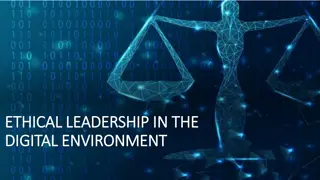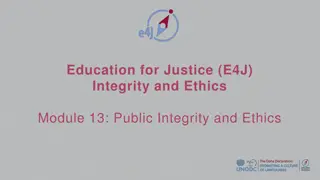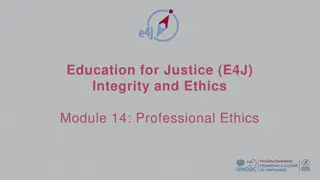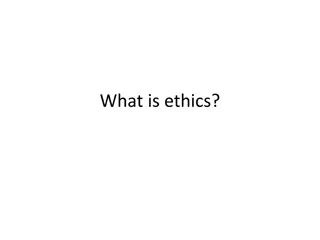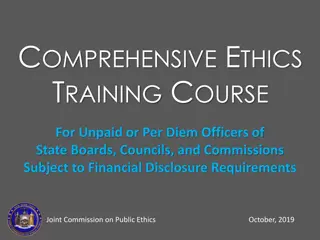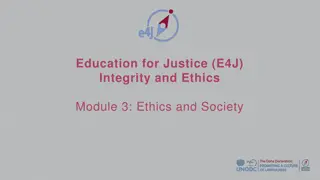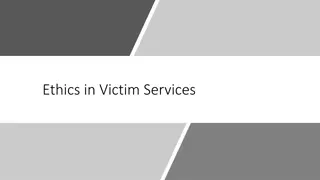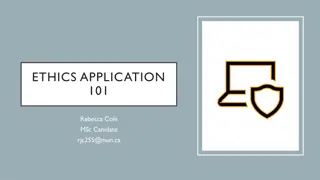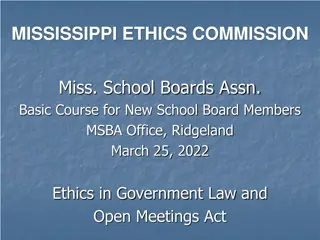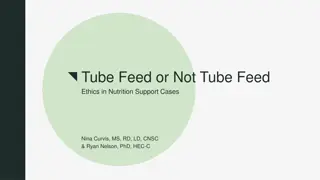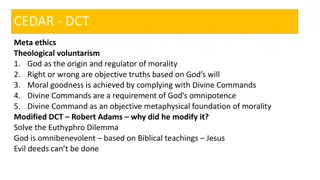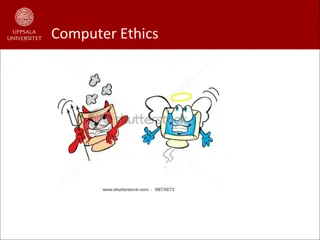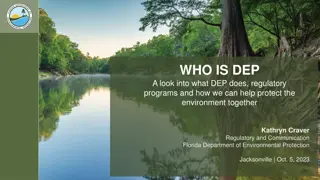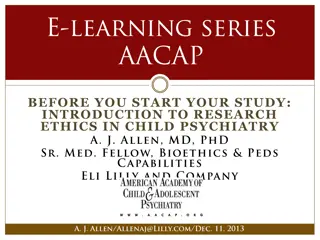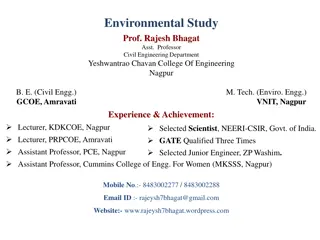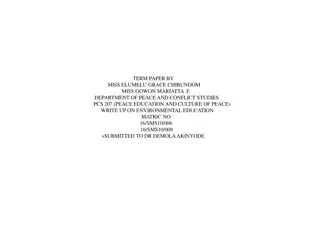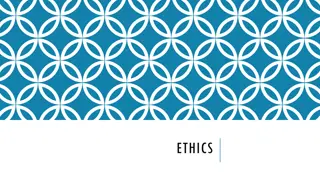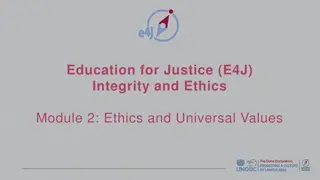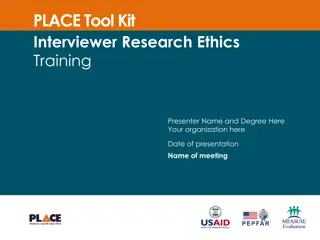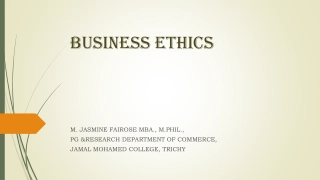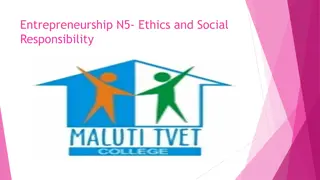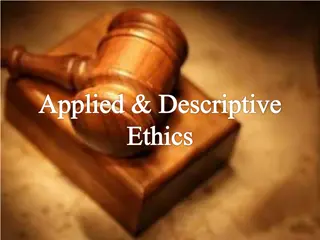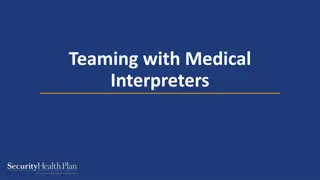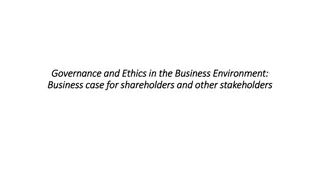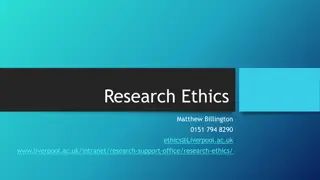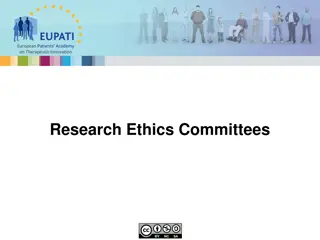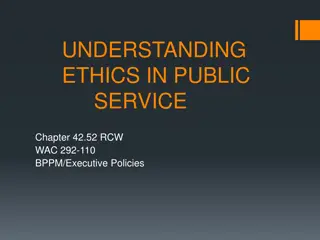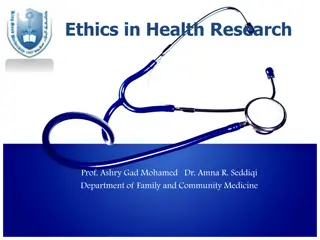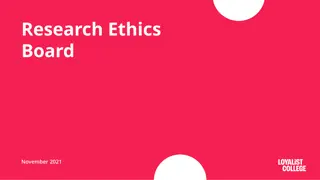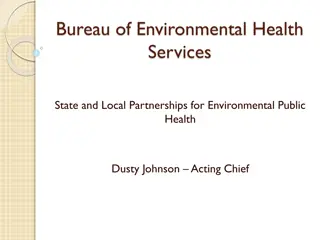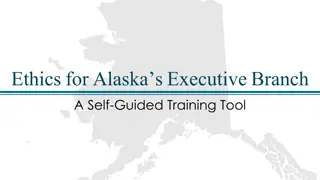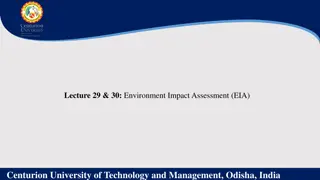Understanding Environmental Ethics: Challenges and Perspectives
Explore the depths of environmental ethics covering a range of topics from endangered species and pollution to climate change and waste disposal. Delve into various ethical perspectives such as anthropocentrism, biocentrism, and species egalitarianism. Reflect on the moral status of different entities and ponder the intrinsic and instrumental value of nature. Contemplate the central question of moral status and consider traditional answers alongside contemporary viewpoints.
Download Presentation

Please find below an Image/Link to download the presentation.
The content on the website is provided AS IS for your information and personal use only. It may not be sold, licensed, or shared on other websites without obtaining consent from the author. Download presentation by click this link. If you encounter any issues during the download, it is possible that the publisher has removed the file from their server.
E N D
Presentation Transcript
Chapter Fourteen: Environmental Ethics
Background The environmental challenges Endangered species Pollution Wilderness preservation Treatment of animals Ecosystem protection Climate change Waste disposal Global population
Background The Environmental Challenges Resource allocation Energy use Economics Food production World hunger Social justice Welfare of future generations
Background Anthropocentrism The notion that only humans have moral status Zoocentrism The notion that both human and nonhuman animals have moral status Biocentrism The view that all living entities have moral status, whether sentient or not
Background Species egalitarian One who believes that all living things have equal moral status Species nonegalitarian One who believes that some living things have greater moral status than others
Background Ecological individualist One who believes that the fundamental unit of moral consideration in environmental ethics is the individual Ecological holist One who believes that the fundamental unit of moral consideration in environmental ethics is the biosphere and its ecosystems
Background Something with instrumental (or extrinsic) value is valuable as a means to something else. (For many people, nature possesses instrumental value only.) Something with intrinsic value is valuable in itself, for its own sake. (For many other people, nature has intrinsic value it is valuable regardless of its usefulness to humanity.)
Background A central question: What entities have moral status and to what degree do they have it?
Background Answers to the question: Traditional answer: Only humans have moral standing (anthropocentrism). Animals both human and nonhuman have moral status (zoocentrism). All living entities have moral status, whether sentient or not (biocentrism).
Moral Theories A traditional Kantian view: This view is strongly anthropocentric. Animals have instrumental value only. Kant asserts, Animals . . . are there merely as means to an end. That end is man.
Moral Theories Traditional natural law view: Thomas Aquinas: Animals are tools to be employed at the discretion of humans.
Moral Theories Modern Kantian theorists: They reject instrumentalist views, asserting that the environment or its constituents have intrinsic value, just as persons are thought to be intrinsically valuable. Paul Taylor: The well-being of [the Earth s wild communities of life] , as well as human well-being, is something to be realized as an end in itself.
Moral Theories Modern Kantian theorists: Tom Regan argues that sentient animals, human and nonhuman, possess equal intrinsic worth and therefore have an equal moral right not to be treated as mere things. The result of applying Regan s view would be the eradication of factory farming, animal experimentation, and hunting.
Moral Theories Utilitarians: Peter Singer (following the lead of Jeremy Bentham): In calculating which action will produce the greatest overall satisfaction of interests, we must include the interests of all sentient creatures and give their interests equal weight.
Moral Arguments When, if ever, do environmental entities or beings have moral status? A natural argument: 1. All natural entities have moral status (intrinsic value or rights, for example). 2. Old-growth forests are natural entities. 3. Therefore, old-growth forests have moral status.
Moral Arguments When, if ever, do environmental entities or beings have moral status? A natural argument: Is Premise 1 true? Common Answers: Yes: Premise 1 is supported by our moral intuitions. No: The property of naturalness does not confer some kind of moral standing on objects.
Moral Arguments Biocentric Egalitarianism (Paul Taylor): 1. Humans are members of earth s community of life in exactly the same way that all other living things are members. 2. Human beings and all other living things constitute a dynamic system of interlinked and interdependent parts. 3. Each living thing is a teleological center of life, pursuing its own good in its own way. 4. Human beings are not superior to other species. 5. Therefore, all living things have equal moral status.
Moral Arguments Biocentric egalitarianism: Taylor: If we accept Premises 1 3, it would not be unreasonable to accept premise 4. Criticism: Premise 4 does not follow from Premises 1 3. (Even if Premises 1 3 are true, we are not obliged to accept Premise 4.)
Moral Arguments Biocentric egalitarianism: Criticism of Taylor s conclusion ( all living things have equal moral status ): Would it be morally permissible to treat a cow as if it had the same moral status as a potato?
Moral Arguments Biocentric egalitarianism: David Schmidtz on Taylor s conclusion: What seems far more problematic for species egalitarianism is that it seems to suggest that it makes no difference what we kill. Vegetarians typically think it worse to kill a cow than to kill a carrot. Are they wrong?
W. W. Norton & Company Independent and Employee-Owned This concludes the PowerPoint slide set for Chapter 14 Doing Ethics: Moral Reasoning and Contemporary Issues Third Edition (2012) by Lewis Vaughn








